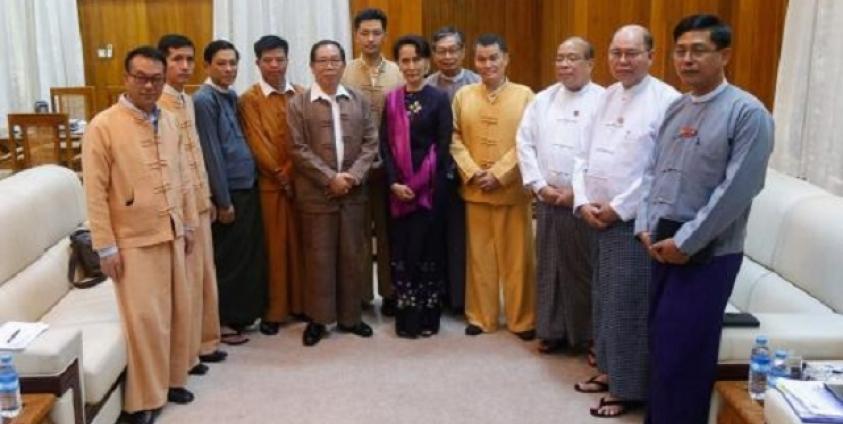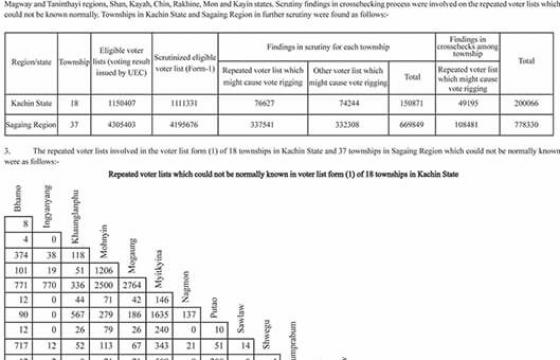Everyman is my superior in some way
In that I learn from him.
(Ralph Waldo Emerson (1803-1882)
My trip this time had two purposes:
- I haven’t been there for over 3 months now and I need to update myself with what’s happening there
- On 25 August, a terrible—some will say brilliant—coordinated multiple attack took place in Rakhine. Knowing how the Tatmadaw tends to react to this kind of onslaughts — especially along the border areas, where whatever happens cannot be completely screened off from the neighboring countries — I wanted to know how it would affect the ongoing peace process.
The visit also coincided with RCSS/SSA chief Gen Yawd Serk’s visit to Naypyitaw to meet the State Counselor and the Deputy Commander-in-Chief of the Tatmadaw.
Needless to say, I would like to know how people saw it. Especially after a series of political and military hiccups with both the government and the Tatmadaw in the past few months.
I hope the journal provides some, if not all, of the answers to the interested reader and myself.
Day One. Monday, 11 September 2017
Peace is the result of re-training your mind to process life as it is, rather than you think it should be.
SayingQuotes.com
While waiting for the plane, I run into some friends one of whom tells me matter-of- factly:
- At least two member organizations of the FPNCC (the 7 member new alliance on the Chinese border) have been bought off, lock, stock and barrel, by You-Know-Who (He sounds rather like those witches in the first book of the Harry Potter series, doesn’t he?)
- The Rakhine border (following the territorial clearance operation by the Tatmadaw against ARSA) is so tightly sealed, the drug smugglers are in trouble getting their merchandize across.
Anyway, at 12:30, I’m at the Pyidaungsu Institute Yangon (PIY) run by Dr Sai Oo aka Sai Lao Liang, who has been helping the Union Peace Dialogue Joint Committee (UPDJC)
There, his researchers inform me about their current assignments:
- Two of them are working on local government, which the PI believes may be a solution to the increasing calls for new ethnic states
- Two others meanwhile are working on bilateral ceasefires signed between Naypyitaw and 15 EAOs. (They have a lot of questions. I tell them maybe able to answer some. As for the rest which I can’t, I can pass them on to those who can)
At 18:00, Dr Sao Lao Liang takes me to Tawwin Hninizi (Royal Rose) in downtown Shwe Gon Daing, where Hkun Htoon Oo is celebrating his 74th birthday.
I have known him since 1962 in Taunggyi, where we were members of the Tai Youth Association. He was then known as Lan Tha-ye (Road Devil) by those who loved and hated him alike.
In 1996, after my arrival in Chiangmai to rebuild the Shan Herald Agency for News (SHAN) with the late Hsengzeun Hsoikhamherng, we made a long distance call to him. I can still remember the first thing he said after the customary greetings: I was quite wild in those days, wasn’t’ I?
Today, he’s one of the most admired and respected man, not only among Shans but also non-Shans, including myself. Asked me why, I have often replied what is the plain truth: People like me can afford to be brave, because we live outside the country. But him, without a weapon, without armed bodyguards, and living in an unpredictable surrounding, is never afraid to speak his mind, at anytime, anyplace, to anybody. He’s one guy all of us Shans can be proud of.
It is there at the party where I also receive what I have been looking forward to The King and I, personal memories of Sai Hseng Mook about his years with the late Khun Sa (1934-2007).
I’m eager to know what he knows about “the King” that I don’t, so I take it to my bed to read it. I don’t finish it, however. You know why.
Day Two. Monday, 12 September 2017
They say they are for federalism. Then they say they want a centralized one. These are funny people.
A former general poking fun at today’s Tatmadaw leaders, 13 September 2017.
The day begins with good news from Naypyitaw on the yesterday’s meetings General Yawd Serk had held with top government and Tatmadaw leaders there:
- The State Counselor who spoke mainly about cooperation against illicit drugs
- U Kyaw Tint Swe, Vice Chair of National Reconciliation and Peace Center (NRPC) and Minister of the State Counselor’s Office, who agreed that the much criticized Framework for Political Dialogue (FPD) should be jointly amended
- Deputy Commander-in-Chief Soe Win who reached agreement with him to hold a review on the bilateral agreement which has been differently interpreted by each side and has led to more than 20 armed clashes since the signing of the NCA in 2015.
“Best of all was the atmosphere,” an RCSS/SSA officer chews over. “It was exceptionally pleasant.”
I spend the morning hours at the PIY again to work on a Power Point presentation on PI and its role in the peace process.
At 13:00, we have a most wonderful lunch at a Kokang restaurant called Ajuyi (အႀကဴရီ).
As shown here in the photos, rice is placed in the middle of a tray normally used to winnow rice, and the savories around it. We are given a flat plate and a pair of chopsticks each.
New in this game, I ask my friends, “So how do I eat without a spoon and fork? Or the regular rice bowl if I have to use these sticks?”
They laugh and put on the plastic bags placed before us. Which turn out to be plastic gloves. Then they start to pick up the savories with their gloved hands and I follow suit.
This is the first time I’ve ever used a glove to eat and it’s exciting. But after a while my stomach is full and my hand becomes so hot I have to pull it off.
The rest of the day, I spend my time visiting friends in Kokkine and Komin Kochin.
One friend, looking at the photos of Sao Yawd Serk which appear on his Facebook, remarks: “Why did he sit jammed between two of his officers when he met Daw Su? This one (pointing at the photo where Sao Yawd Serk was meeting with the Deputy CinC) is better. This is how they should sit.”
He wasn’t at the lecture session which I attended on 4 September, but readers of my Learning to Share journal will remember he is saying the same thing our resource person was telling us on that day.
Day Three. Wednesday, 13 September 2017
The only law I believe in is the law of preservation.
Chief villain in Destry (1954)
Today I’m meeting friends at two unidentified places. The first one, we (Saw Htoo Htoo Lay and myself) find 12 of them, the second 3 of them. 4 of them used to be high ranking officers in the Tatmadaw. Needless to say, they have full of information and full of ideas for a poor, knowledge-starving exile visiting Hopeland.
These are the things they say that should be food for thought for all of us:
On RCSS/SSA visit
- Very timely, because had we waited until after 25 August to prepare, it wouldn’t have taken place. The visit has also saved the peace process in a way. Because some had been advising the Tatmadaw to remove the RCSS/SSA from the list of signatories (due to its perceived violations of the NCA and bilateral agreements).But the Deputy CinC reportedly asked them, “So you think the remaining 7 will stick together with us after Yawd Serk leaves?” That stopped them. As it was obvious the suggested move would have tilted support for the hardliners in KNU/KNLA and others.
On Rakhine situation
- Too much misinformation and disinformation on both sides. We are calling the ARSA attack as an act terrorism. But people outside are calling our counterattack as an act of genocide. We are already been accused of committing 1-4 of the 5 acts defined as genocide.
(For the sake of those who are not familiar with the 5 acts, including myself, here they are:
- Killing members of the (national, ethnical, racial or religious) group
- Causing serious bodily or mental harm to members of the group
- Deliberately inflicting on the group conditions of life calculated to bring about its physical destruction in whole or in part
- Imposing measures intended to prevent births within the group
- Forcibly transferring children of the group to another group (Burma/Myanmar is a signatory of the Convention since 1949)
- The Tatmadaw has reportedly proposed that the two townships in conflict be declared under martial law in accordance with Section 412 of the 2008 constitution. Kokang in Shan State, for instance, is still under Martial Law. However, the government doesn’t agree.
The situation meanwhile is worsening: the slowing of foreign investment, cancellations of tourist visits (a friend says one agency alone has complained the loss of $150,000 two days ago) and interfaith tensions might aggravate the situation and eventually become uncontrollable. Then there are going to be some hotheads calling for the enforcement of Section 417 (b) through which just 4 members of the all-powerful National Defense and Security Council (NDSC) can declare martial law throughout the country, on the grounds that the situation has gone far enough to endanger the sacred Three Causes. “Everything will be back to square one,” comments a foreign friend whom we have known since 2000, “if this happens.”
A friend then suggests the EAO signatories should release a statement in support of the Tatmadaw. “That will slacken the tensions between the EAOs and the Tatmadaw,” he believes.
But another former officer like him disagrees. “That will only serve to exacerbate the situation.” He instead suggests more informal meetings that will help build more trust and confidence between the two sides. “It’s been sometime since the KNU and the Tatmadaw chief have last met,” he says. “These meetings should resume, the sooner, the better.”
Closer relations between the Tatmadaw and the EAOs
You want to amend the constitution. But without trust between the main stakeholders the EAOs and the Tatmadaw—I don’t see any other way right now. Other approaches should also be sought: like doing a security sector research together.
The Tatmadaw is still suspicious the EAOs will join up with the NLD, and together with a people’s uprising, will try to overthrow it.
On the Peace Process
The finishing line used to be nearer. But as we move on, it has gone farther.
Both sides —government and EAOs—appear to be undergoing divisions among themselves. And the gap between the two sides has increasingly become wider.
Human beings are creatures of emotion. We should therefore not feel prematurely assured that nobody’s going to be foolish enough to go back to war.
Let’s try to reach a common agreement for the whole union first. Only afterward should we negotiate on what each group wants.
On the government
One friend says, “The time for comparing the government in office with the previous one is over. Now we have to focus on how best to work with the present one.”
It doesn’t stop another from picking holes with the NLD-led administration. “We have the National Reconciliation and Peace Center (NRPC), but it hasn’t met once during the past 10 months,” he says. “The only two meetings it has had were with the PC.”
According to them, the whole peace process is at the mercy of just 3 persons: The State Counselor and her two deputies. And since she has her hands full with other responsibilities, she seems to have placed everything that has to do with peace on the two. “The process used to have a rudder,” says another. “Now we have none.”
Both the NRPC and PC need more people to make it work. “The PC doesn’t have an office staff and had to rely on Dr Tin Myo Win’s 3 personal assistants. And recently they were fired, without rhyme or reason.”
And while we are having lunch, one quips, “This is not just a mission impossible. It’s a suicide mission.”
On FPNCC
The only good thing we can say about the FPNCC (Federal Political Negotiations and Coordination Committee) is that it has sworned not to be a military alliance. But since it has spurned the NCA, holding negotiations with them now is out of the question.
However, the more we refuse to meet, the worse the relations will become. For one thing, we can arrange informal meetings like we’ve been doing with chairmen Yawd Serk and Mutu Saypoe. For another, we can discuss border development projects, if not politics. And to start building mutual trust from there.
Maybe the PPST should start thinking about lending a hand here.
On the UNFC/DPN
The Tatmadaw has no reason to sign a separate agreement with the alliance. But we can agree to a joint statement after agreement on its proposed 8 points has been reached. We also have no objection, if it agrees to sign it with the PC.
We stand by the NCA, no more, and no less.
On JICM
The Tatmadaw thinks holding a JICM is a good idea. However, the NRPC has not responded to the PPST’s request on 25 August. Probably it doesn’t understand what and why the PPST wants it.
An official letter from the PPST is recommended. Bureaucrats (I use it in a neutral sense) are at ease only when everything is official. Informal ones make them uneasy. If you understand this, you won’t be in a hurry to find fault with them.
On China
The Communist Party of China (CPC) is holding its 19th National Congress next month. And since it is going to make a far-reaching change in the makeup of its top leaders, security is especially tight. They don’t want any trouble along the border. Particularly not at this time.
As for the peace process in our country, they think it will take at least another 10-15 years to achieve peace. So their biggest worry is not about peace, but stability along the border.
In line with that view, its special envoy Mr Sun Guoxiang reportedly visited the PC lately.
I drop in at my brother’s home in Htedan to discuss about a translation project I have in mind. As I take leave, swinging my arms into the backpack, my niece says, “You look like a kindergartener.”
Then when I put on my cap, she giggles and exclaims, “Now you are a kindergartener.”
Since it’s the first time I’ve been called this since 1956, I have a good laugh. Somehow it makes me feel good.
Day Four. Thursday, 14 September 2017
If you’re not enjoying your work, you’re in the wrong job.
Tweet for President Trump, Thai Channel 3, 6 August 2017
I have 4 meetings today. But since most are a repetition or confirmation of what I have already reported yesterday, I won’t bother the reader with more details.
The next day, I’m back in Chiagmai. As the plane bumps on the runway, I turn off the last page of ‘The King and I’.






